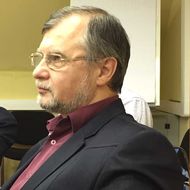- A
- A
- A
- АБB
- АБB
- АБB
- А
- А
- А
- А
- А
- Национальный исследовательский университет «Высшая школа экономики»
- Учебные подразделения
- Факультет социальных наук
- Департамент политики и управления
- Мероприятия
- Instrumentality and/or Identity? Explanation of Participation in Collective Action in the Gabonese Repressive Context Based on the Dual-Pathway Model of Social Movement Participation
-
Департамент
-
Подразделения
- Секции
- Кафедры
Адрес: 101000, г. Москва, ул. Мясницкая, д. 11, комн. 512
Телефоны:
+7(495) 772-9590 доп. 22717
+7(495) 772-9590 доп. 11345
Факс:
+7(495) 772 9590 доп. 11308
Email: IOrlov@hse.ru
 Воздействие институциональных реформ в Российской Федерации на устранение условий для коррупции
Воздействие институциональных реформ в Российской Федерации на устранение условий для коррупции
Артеменко Е. А., Бурский И. Г., Крылова Д. В. и др.
М.: Издательский дом НИУ ВШЭ, 2024.
Телицына А. Ю., Земсков А. И.
Научные и технические библиотеки. 2024. № 4. С. 131-145.
In bk.: Terrorism and Political Contention. New Perspectives on North Africa and the Sahel Region. Springer, 2024. P. 349-400.
Шишкин С.В., Шейман И.М., Власов В. В. и др.
Государственное и муниципальное управление. WP8. Высшая школа экономики, 2023. № 1.

Instrumentality and/or Identity? Explanation of Participation in Collective Action in the Gabonese Repressive Context Based on the Dual-Pathway Model of Social Movement Participation
Gustave Adolphe Messanga, Sylvestre Nzeuta Lontio (Department of Philosophy-Psychology-Sociology, University of Dschang, Cameroon), Clotilde Ayingone Obame (Département de Psychologie, Laboratoire PSITEC-URL 4072, Université de Lille, France)
Abstract: The dual-pathway model of social movement participation posits that engagement in social movements is done through an instrumental pathway (by evaluating the costs and benefits of participation) or an identification pathway (by becoming aware of the similarity and destiny shared with members of the same social category as oneself); these pathways are mutually exclusive. In the present research, this postulate, formalized and tested until now exclusively in a democratic context, is tested in a repressive context, which differs from the democratic context due to the quasisystematic recourse of the institutional authorities to coercive tactics to prevent the expression of dissident discourse and conduct. The data were collected during a student social movement from 389 Gabonese students (232 men and 152 women), aged between 16 and 33 (M = 23.9, SD = 3.20). They were administered self-reported measures, focusing on instrumentality, identity, and intention to participate in protest action. The results report that the instrumental and identification pathways simultaneously predict the intention to participate in protest action. They are therefore not mutually exclusive, as the model suggests.
Date: March 29th, 12.00
The link will be sent before the seminar.
- О ВЫШКЕ
- Цифры и факты
- Руководство и структура
- Преподаватели и сотрудники
- Корпуса и общежития
- Закупки
- Обращения граждан в НИУ ВШЭ
- Фонд целевого капитала
- Противодействие коррупции
- Сведения о доходах, расходах, об имуществе и обязательствах имущественного характера
- Сведения об образовательной организации
- Людям с ограниченными возможностями здоровья
- Единая платежная страница
- Работа в Вышке
- ОБРАЗОВАНИЕ
- Лицей
- Довузовская подготовка
- Олимпиады
- Прием в бакалавриат
- Вышка+
- Прием в магистратуру
- Аспирантура
- Дополнительное образование
- Центр развития карьеры
- Бизнес-инкубатор ВШЭ
-
http://www.minobrnauki.gov.ru/
Министерство науки и высшего образования РФ
-
https://edu.gov.ru/
Министерство просвещения РФ
-
http://www.edu.ru
Федеральный портал «Российское образование»
-
https://elearning.hse.ru/mooc
Массовые открытые онлайн-курсы
- © НИУ ВШЭ 1993–2024 Адреса и контакты Условия использования материалов Политика конфиденциальности Карта сайта
- Редактору


